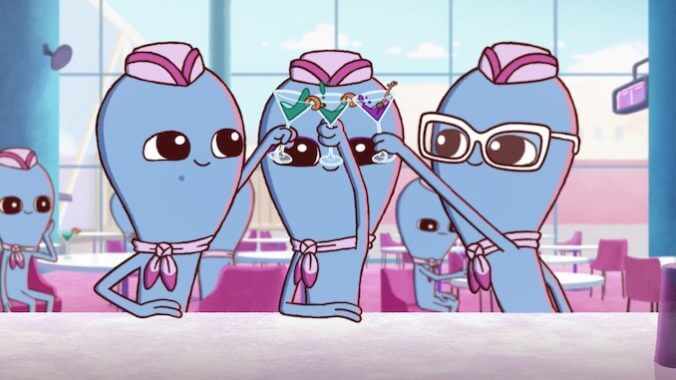Strange Planet Is a Sweet If Occasionally Insubstantial Adaptation of the Beloved Web Comic
Photo Courtesy of Apple TV+
In our current entertainment landscape, there’s almost no surer thing than an existing IP. Granted, not everything can be based on a known property with the cultural heft of, say, the Barbie movie, but there’s no getting around the fact that any media that comes with the possibility of a pre-built audience attached is a super hot commodity. It’s why we have shows like The Witcher and films like The Super Mario Brothers Movie, after all—the folks in charge of Hollywood are a lot more comfortable spending money on a known quantity than perhaps they ought to be.
But, on the plus side, for every Sonic the Hedgehog movie, there’s a Strange Planet, an offbeat adaptation that puts something deeply heartfelt and lovely in front of way more people than might have ever experienced it otherwise. Such is the case with Nathan W. Pyle’s beloved webcomic, made popular via Instagram and a couple of compilation books, which finds itself transformed from a series of four-panel drawings into a lovingly-rendered Apple TV+ cartoon. And while some of both its appeal and its bite may be lost in the translation between formats, its existence nevertheless feels like a breath of fresh air.
Pyle’s comic follows the story of creatures known as beings, charming blue aliens with bulbous heads, skinny, spindly bodies, and a love of literalism. On the planet Orb, these beings lead lives that look quite similar to our own, save for the fact that their names for things are overly, almost painfully exact. Alcohol is “mild poison,” socks are “foot tubes,” and the heart is a “blood pump”. Beings don’t have parents, they have “life givers,” they express “gratitude” rather than say “thank you,” and head home at night to feed their “vibrating creature” rather than their cat. The hyper-specificity of Strange Planet’s language gives it an awkwardly scientific feel that often sounds like an outdated Saturday Night Live sketch, but the juxtaposition of painfully precise language with universal truths about the absurdities, joys, and challenges of living makes for a strangely perfect balance.
It’s fair to ask whether this sort of explicitly literal comedy can be effective (or entertaining) when dragged out over a long enough timeline, and there’s an argument to be made that this show is one meant to be consumed in small bites, lest viewers oversaturate themselves with saccharine platitudes and/or uncomfortable meditations on the fleeting nature of consciousness. To its credit, the Apple TV+ series is absolutely beautiful to look at and feels like nothing so much as the panels of the comic come to life onscreen with its signature color palette of blues and pinks. Strange Planet leans hard into the heartfelt, using the utter absurdity of the aliens’ lives and the world they inhabit to highlight the beauty of possibility and joy rather than the threat of failure or loss. The stories are charmingly universal, exploring simple and relatable truths of family, friendship, and self-discovery. And there’s a quietly subversive feel to the way the series addresses big-picture concepts like love, loneliness, and mortality, breaking down some of the biggest questions facing our species into wholesome bite-size chunks.
Yet, the show also struggles to find a way to translate the simple truths of Pyle’s four-panel comics into half-hour episodes, which require more substantial narrative and emotional arcs, easily identifiable and distinguishable characters, and action that involves more than a simple conversation. None of the series’ characters have names, and all are generally sexless and often referred to by they/them pronouns. They’re generally only identifiable through the brightly colored accessories or specific pieces of clothing they wear, or sometimes by the job they hold. Unlike the comic, in which Pyle’s aliens are purposefully generic, the Apple TV+ series must find a way to not only distinguish these characters from one another, but give them distinct stories as well, and it is not always successful in this endeavor.
-

-

-

-

-

-

-

-

-

-

-

-

-

-

-

-

-

-

-

-

-

-

-

-

-

-

-

-

-

-

-

-

-

-

-

-

-

-

-

-








































